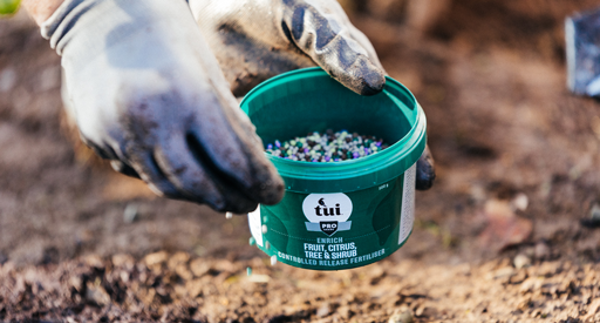
Feed your plants and they will feed you! Plants use nutrients from the soil as they grow, so replenishing the nutrients ensures you get maximum yields and long lasting crops.
A well nourished and watered garden will also have a better chance of keeping healthy and keeping insect pests and diseases at bay.
Healthy soil for healthy plants
There are two types of fertiliser needed to create healthy gardens. Soil conditioners like sheep pellets, compost and blood and bone are essential to improve the physical condition of the soil by improving the structure, micro-organism activity and the water-holding capacity of soils. Soil conditioners need to be broken down by microorganisms present in the soil for the nutrients to be accessed by plants.
Blended fertilisers provide a balanced blend of the nutrients mentioned under ‘what makes up a fertiliser’, that are readily available for the plants to use, as they don’t need to be broken down first. You can buy varieties specific to the type of plant you are feeding – e.g. Tui Tomato Food for tomatoes, or a general fertiliser like Tui NovaTec Premium to feed your whole garden.
What and when to feed
For healthy gardens a combination of both soil conditioners and blended fertilisers should be used. Remember to always water well after feeding.
- Regular applications of soil conditioners like Tui Sheep Pellets throughout the garden will condition the soil and attract worms - a gardener's best friend. It's a good idea to dig in soil conditioners prior to planting.
- For plants in pots and containers use Tui NovaTec Premium fertiliser as this is a compound fertiliser which means it has the same ratio of nutrients in each prill, so your plants receive a balanced and even spread of all essential nutrients and won't be overfed.
- For supercharged feeding with quick visible results try the Tui Liquid Superfood Range - your complete Liquid Fertiliser with premium ingredients.
- Apply Tui Strawbery Food to your strawberries every four weeks or so from when they start flowering for a bumper crop. Remember to keep picking your strawberries to encourage more fruit.
- Potatoes and tomatoes are gross feeders - this means they need feeding regularly (every four weeks or so) with Tui Potato Food or Tui Tomato Food.
- Give fruit trees a boost with Tui Enrich Fruit, Citrus, Tree & Shrub controlled release fertiliser. For established trees make holes with a garden stake around the dripline of the plant about 10cm deep, place the prills into the holes and cover up. For best results apply in early spring and late summer.
- If you have a worm farm dilute your worm tea with water at a 1:10 ratio and feed your whole garden with your own homemade fertiliser.
- Boost your plant growth with a powerful blend of seaweed and fish that's suitable for the whole garden. Tui Seaweed & Fish Fertiliser is specially formulated with added plant nutrients to encourage healthy plant growth, fruit and flower production. It also conditions soil, improving clay and sandy soils and encouraging microbial activity.
- The Tui Performance Organic fertiliser range includes pelletised fertilisers in all purpose, a tomato & vegetable and citrus & fruit variants. Made with 100% BioGro certified organic ingredients, they combine fast acting natural sources of nutrients with slow release feeding to support rapid and consistent growth – the natural way.
Tui Organic Seaweed Plant Tonic
Regular applications of Tui Organic Seaweed Plant Tonic throughout your garden will help strengthen your plants against extremes in temperature, making them better able to cope with the hot summer days. You can apply Tui Organic Seaweed Plant Tonic year round, every few weeks, as an overall health treatment, in addition to fertiliser. As a plant tonic it doesn’t have an NPK, so you can’t overfeed your plants! Think of it as a multivitamin tablet, to keep your plants nice and healthy so you can reap the rewards.
What makes up a fertiliser
Fertilisers are made up of a blend of different nutrients. Nitrogen, phosphorus, potassium, calcium, magnesium and sulphur are usually required in relatively large quantities, and so are known as ‘macro nutrients’.
Iron, chlorine, copper, manganese, zinc, molybdenum and boron are usually required in minute amounts, and are known as ‘micro nutrients’ or ‘trace elements’. Despite the name ‘micro’, these are still important - if one of these elements is deficient it may cause abnormalities. If a trace element is present in too high a concentration it may be toxic to the plant or lock up other elements. The correct balance is essential.
The three major nutrients your plants need
There are three major 'macro nutrients' in fertilisers and each plant likes these main ingredients in different amounts. This is represented as an NPK value on fertiliser packaging.
It’s the quantities and ratios of these elements that make the difference, but there are plenty of other goodies in the bag specifically designed for each plant.
N-P-K
- N=Nitrogen, this stimulates thick, rich, green growth of plants.
- P= Phosphorus, this encourages root development and growth.
- K = Potassium, which is responsible for the formation of flower buds and fruit and maintains overall plant health.
The proportion in which these are present in the fertiliser is on the front of the pack as an NPK ratio.
Watch our Tui Grow Guide video on when and how to feed your plants here >
See our guide to choosing the right fertiliser here
Post a comment
Feeding Your Crops Guide Comments
Be the first to write a comment